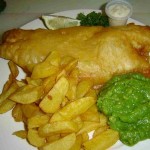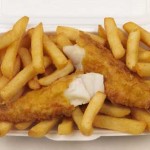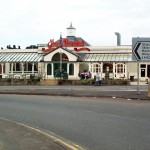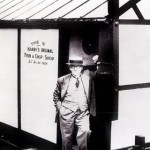Fish and chips is the archetypal British working man’s food. Remembering that before cod and haddock were fished virtually to the point of extinction, we were a nation with abundant riches off our shores. We fried our fish in batter so the delicate treat was moistly poached within. In fact, like pies in the era of Henry VIII, the crust or batter merely a container for cooking, discarded in the eating. At some point in history, we developed a taste for pie crusts and batter, and pies and battered fish have never looked back since. The first chippie was apparently opened by a Jewish proprietor in 1860 and soon thousands arrived on the scene.
The chippie is so engrained in our culture that it’s utterly unthinkable we could manage without them as a comfort food option after a hard day. In the British eye, there is something about the romance of fish & chips in the paper by the seaside that brings a tear to our eye. Granted there are other options too – pies, chicken, sausages and suchlike if fish is not your bag. Coming from the Manchester area, mushy peas (AKA ‘Lancashire caviar’) are de rigeur, and you can even buy them in the south these days – a sure sign my missionary work down here has paid off after all these years!!
To others, the perfect meal is chips with gravy or even curry sauce – not an Indian-style curry sauce, but that generic out-of-a-packet variety beloved of Chinese takeaways. If you’re not British, all this may be meaningless, but it is close to the heart of the vast majority of Brits!
In posh places they might offer you a slice of lemon and/or tartare sauce, but tradition also dictates that you have with your fish & chips with salt and vinegar – though sadly most places do not use true brewed malt vinegar these days. How on earth did we come to get to the point where a cheap and nasty “non-brewed condiment” was an acceptable alternative to traditionally-made malt vinegar? At any rate, there are still devotees of tomato ketchup too, and doubtless somewhere someone prefers brown sauce – chacun à son goût!
The fish itself is rather more restricted than in years past. True, you still get cod and haddock, though given the restrictions on fishing these are likely to be farmed, or even, whisper it, pollock, coley or other lesser breeds of white fish that look and taste not dissimilar to cod. At one time, you could also order rock salmon, skate or ray, and an amazing range of other fishy treats. Very rare to see much variety these days, but somehow we seem to have narrowed our tastes – or rather, expanded them to the point where some fish and chip shops also sell kebabs, pizzas, fried chicken and goodness knows what else.
This brings me on to chips themselves, which sadly in most British establishments are not the masterpieces of fried potato magnificence they ought to be. Too many are limp and soggy, where they should be twice-cooked, crisp on the outside and fluffy on the inside. Why do chip shops not insist on cooking them properly, other than that it takes a little longer? I’m not sure on that point, but doubtless some would tell you consumers prefer their chips that way. If there were a direct choice between crispy and limp, I’m quite sure which we would prefer to buy, but there are precious few that cook chips properly.
Two such establishments linger long in the memory. One was on Mill Hill Broadway, another Jewish establishment that offered a choice between batter and matzo meal as a coating for the fish, all fried to order and perfectly cooked. The chips had already had their low-heat blanching and sat waiting for orders. At the last minute, they were dunked into very hot ground nut oil (this being the south – in Lancashire and Yorkshire beef dripping is the only acceptable cooking medium!) The result was perfect, fresh, hot, crispy chips. Easy to do, so why doesn’t everywhere do them? Do wonder if that place is still open – hope so!
More recently I found a brilliant chippie in the unlikely setting of a housing estate in Slough that cooked fish and chips perfectly to order, though it was easier for them to do so because hardly ever did I see anyone else there. The time factor and willingness of patrons to wait for the food to be cooked fresh is a relevant factor here. I’d say it’s worthwhile every time! Anyway, this place was newly opened, devoted to quality and deserved every success.
I will also admit, shame-faced, that one of the best fish & chip suppers I ever had was at a small independent restaurant in San Francisco in 1980, which also cooked to order and was indicative of love and care rarely if ever shown by chains.
There are a number of great chip shops around the country, many vying for the title of Chip Shop of the year – of which there are several such awards (eg. this and this.) But we can’t discuss fish & chips without also discussing the shrine to the humble chip, Harry Ramsden’s.
The original HR was and is in Guiseley, near Leeds. Harry began cooking there in 1928, in a wooden hut. Eventually he built the premises on which his reputation was made – a veritable palace of a chip restaurant, equipped with fitted carpets, chandeliers and oak panelled walls. It was the largest fish & chip shop in the world, and was celebrated in the Guinness Book of Records.
But then the name was sold to a succession of catering giants. Merryweathers took control in the 80s, then Granada, then Compass, and finally were spun off under the name SSP. The strategy adopted under these owners was to franchise (some would say prostitute) the name around the world, though they have closed down the Guiseley restaurant just a few weeks ago – truly the greatest tragedy in the fish and chip world.
Where once Harry prepared good fresh haddock to order, you will now encounter his name in motorway service stations, serving frozen and reheated fish and chips. The name is to be found everywhere – I even encountered a Ramsden’s near the Happy Valley race track in Hong Kong!! But the commodotisation of Harry into a brand name does not make for happy news. I’m quite sure Harry would spin in his grave if he could see what has happened to his own modest empire, built upon quality fish & chips and service in a unique and amazing environment.
In the process, Harry Ramsden’s lost its soul. The whole point of the fish & chip shop is that it should be run as a small, family concern, cooking good, fresh food from scratch at a fair price, but even bigger concerns can focus on the quality of food rather than profit and logistics. Goodness knows, there are no shortage of corporate fast food brands these days, from burgers to kebabs to pizzas and many more besides. The humble chippie has, by and large, stayed true to its roots and should be celebrated as such. Buy from your small independent rather than chains!
PS. Yesterday evening I ate fish & chips on a park bench on Writtle Green as the sun began to set. The fish & chips were good but not the best, but the location was wonderful. Maybe it is all location location location – eating fish & chips from the paper in a great location is an experience to delight the soul of everyone! 🙂
PPS. This video is a loving insight into a caring fish & chip shop, though I still think they should be doing twice-cooked chips. Soggy British chips are wrong every time!!
PPS. See here for an interesting discussion on the subject.
PPPS. Fish & chips can however be made well in a chain environment. Rick Stein shows how!






